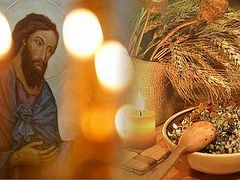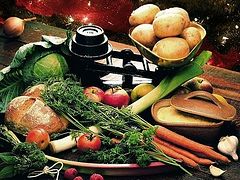Tomorrow is the official beginning of the Nativity fast (although we are really starting today, since it’s Wednesday). This fast is also called the “St. Phillip fast”, since it begins with the feast of the Apostle Phillip.
 Homemade stuffed turkey for the Nativity fast. Photo: The Spruce Eats. Recipe here: https://www.thespruceeats.com/homemade-vegetarian-tofu-turkey-with-stuffing-3378169
Homemade stuffed turkey for the Nativity fast. Photo: The Spruce Eats. Recipe here: https://www.thespruceeats.com/homemade-vegetarian-tofu-turkey-with-stuffing-3378169
The Church rubrics teach us what we should abstain from during the fasts: “All who piously fast should strictly follow the rules on the quality of foods; that is, they should abstain during the fast from certain foods, not as though these foods defile (may it not be!) but because they are not acceptable and forbidden by the Church during a fast. The foods from which we should abstain during the fast are: meat, cheese, butter, milk, eggs, and on some days fish, according to the differences in the holy fasts.”
The rules of abstinence prescribed by the Church in the Nativity fast are as strict as the Apostle’s fast. Besides that, on Monday, Wednesday, and Friday, the Nativity fast rubrics forbid fish, wine, and oil, and we are to take food without oil (xerophagy) only after Vespers. On the other days—Tuesday, Thursday, Saturday, and Sunday—food is allowed with vegetable oil. Fish during the Nativity fast is allowed on Saturday and Sunday, and on great feasts, for example, the feast of the Entrance of the Most Holy Theotokos into the Temple, on patronal church feasts, and on the commemoration days of great saints if they fall on Tuesday or Thursday. If the feast day falls on a Wednesday or Friday, then the fast is only relaxed to the allowance of wine and oil.
From December 20 to December 25 (old style) the fast is intensified, and on these days, fish is not blessed to be eaten even on Saturday and Sunday. According the old calendar, secular New Year’s Day falls right during this period, and we Orthodox Christians have to be especially vigilant not to violate our strict fast with merry-making, alcohol imbibing, and eating non-fasting foods.
The Nativity fast is often called the “grain” fast. The master of the table is the grain dish.
Boiled grains are one of mankind’s most ancient foods. There is an opinion that bread came from boiled grains—thick, over-boiled grains are the prefiguration of the unleavened flatbreads. Gradually the grains for these flatbreads began to be more finely ground and thus flour was born, and along with it unleavened bread.
In Russia, boiled grains or “kasha” was one of the main dishes. In ancient Russia, kasha meant any food that was boiled from ground or finely cut ingredients. There are ancient sources that cite bread kasha made from dried bread, fish kasha, and so on.
Kasha was made from oats, barely, buckwheat, and other grains. The most honored kasha in Russia has always been that of buckwheat.1
While fasting bodily we must also fast spiritually. “In fasting bodily, brothers, let us also fast spiritually, and break all the bonds of unrighteousness,” the Holy Church commands us. A bodily fast without the spiritual fast brings no salvation to the soul, and even to the contrary can be spiritually harmful if a man who abstains from food is filled with thoughts of his own superiority from knowing that he is fasting. A true fast is bound up with prayer, repentance, and refraining from the passions and vices, uprooting evil works, forgiving offences, refraining from marital relations, excluding frivolous and showy events, or watching television. Fasting is not the end but the means—a means by which we humble our flesh and purify it from sins. Without prayer and repentance, the fast becomes no more than a diet.
The essence of the fast is expressed in the following Church hymn: “In fasting from foods, O my soul, if you do not cleanse yourself of the passions, in vain do we comfort ourselves by not eating; for if the fast does not bring on our correction it is then hateful to God as false, and make us like the evil demons who never eat.”
For those Orthodox Americans who will be observing Thanksgiving dinner tomorrow, we offer these dishes pulled from the many internet sites for vegans, who fast year-‘round, only not necessarily for Christ’s sake. But we can certainly make use of them throughout the fast. After all, Thanksgiving is about giving thanks—and what better way to give thanks to God than to sacrifice our turkey for the sake of Christ!
22 Vegan Thanksgiving recipes. Haven’t tried them, but they really look delicious. There is a vegan gravy recipe included. And, if that was not enough, here are 35 more. This set of recipes comes from Country Living, and includes things that look more like our old favorites.
A variety of tofu entrées. Of course we haven’t tried them all but they look good and easy.
Hot and sour soup. Great for colds.
Roasted autumn vegetables. This is very easy and exceedingly tasty and nutritious. We recommend rosemary as the herb to use.
Garlicky mashed cauliflower. For those who don’t want to take up all the “room” with mashed potatoes.
Vegan pumpkin pie (no tofu). Tried it. Very good, some would even say it’s better than the original. It works well using cornstarch or tapioca starch. The coconut whipped cream is a real find.
Cashew cream cheesecake. Also tried it, and it tastes much better than any tofu counterpart. Make sure you use a powerful blender, though. The soaked cashews have to be absolutely creamed in order to work properly. You don't have to use the crust shown in the recipe if it's too expensive or time consuming--just make a simple cookie crust by crumbling vegan oat cookies or graham crackers in a food processor and wetting them with vegetable oil, then pushing them into a pie plate.
Apple muffins. Best we’ve found.
Cashew icing. Same warning as the cheesecake. Has to be well creamed. It doesn’t work well if it’s grainy.
2-ingredient caramel-chocolate cups. This recipe is amazing in that it’s so easy and so tasty. We’ve tried it using a microwave oven to melt the chocolate. It can be used year-round as a healthier candy than say, caramel turtles.





